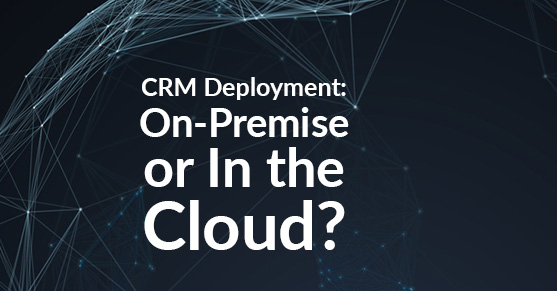One of the biggest questions that needs to be answered when implementing any software — especially CRM (customer relationship management) — is, “where is this software going to be hosted?” “Is this going to be hosted on my own in-house servers or in the cloud somewhere?”
There are advantages and disadvantages to both deployment options. Depending on many things, including your hardware already owned, budget, the size of IT team, etc., one may make more sense for you over the other. Below is an outline of the many benefits of each option. If you’re on the fence on which way you want to go, read the following. It may just provide you with the answer(s) you need!
Option One: Why should I deploy in the Cloud?
Easier Accessibility:
Can be accessed from anywhere, without any installation on any device as long as there is an internet connection. With Cloud, there is no need to have your outside team remote desktop into any solution. They can simply open their CRM app or web browser and they’re right in!
Automatic Backups:
When hosted on a cloud server, backups are automatically taken. Depending on your chosen solution, it may change how often backups are taken; however, no matter what you choose, you’ll have the confidence knowing they happen safely and automatically.
Known Easy-to-Define Pricing:
Ongoing, annual pricing that changes based on user counts. You don’t pay for what you don’t use.
Lower Hardware Costs:
You no longer need to have all the software and hardware to host your CRM locally. With the Cloud, you can scrap the need for servers and any other hardware/software you may need to own in order to run it on-prem.
Less IT Maintenance Required:
Much less of a burden on your IT staff to maintain a Cloud solution that is hosted locally on your own servers. If your organization does not have a large IT team, Cloud is typically always the best way to go.
Easier to Remain Current on Software:
When hosted on the Cloud, it is easier to stay up-to-date on what’s new and when to upgrade. If you’re on a multi-tenant Cloud environment, upgrades become seamless instead of having to actually pay to have a team work on your upgrade with on-prem hosting.
Strong Security:
Very strong security measures have been taken on the Cloud server to ensure your data remains safe.
Disaster Recovery:
Disaster recovery plans are in place 99.9% of the time should anything happen to affect your data.
Faster Access to Software Updates:
With CRM, more and newer functionality is released on the Cloud initially, then released at a later date for the on-prem solutions.
Option Two: Why should I deploy On-Premise?
Full Control:
When your data is hosted on-premise, you have full control over the development that happens around the CRM database. When hosted in the Cloud, depending on the solution, you may be somewhat dependent on the capabilities allowed on the software in the Cloud. Meaning, you may not be able to custom develop solutions to the extent you want or need.
Data Security:
As outlined above, Cloud software has really stepped up and taken the security aspect very seriously. However, in today’s business environment, some people may still not feel comfortable with their data being stored in the Cloud. By going on-premise, your data is stored locally in-house.
Data Sensitivity:
Piggybacking off the above consideration, not only is it important to some to keep the data stored locally, but this can be especially true if the data you’re maintaining is extremely sensitive.
Download Speed:
While leveraging the Cloud gives easy access to your data from anywhere without having to VPN in to get it, there’s still benefit to having it hosted on-premise. When your organization has an extremely large volume of data, it can sometimes lead to issues when stored in the Cloud. Data can also be downloaded much quicker when stored locally.
Integration:
While not always the case, it is sometimes easier for integration purposes to host on-premise. Should you need to integrate your CRM with a back-end database that’s also stored locally, having the two systems both on-premise can make integrating the two solutions much more straightforward.
In Summary
As you can see, there are many great reasons to go on-premise or Cloud. Modern best practices say that Cloud is definitely becoming more mainstream and the trend for many organizations for scalability, rapid deployment, and flexibility. However, it may not be right for every organization. Hopefully, this blog gave you the information needed to help you come closer to a decision that’s right for you. If you still have questions, please do not hesitate to reach out to us at remoteCRM, powered by XTIVIA!

